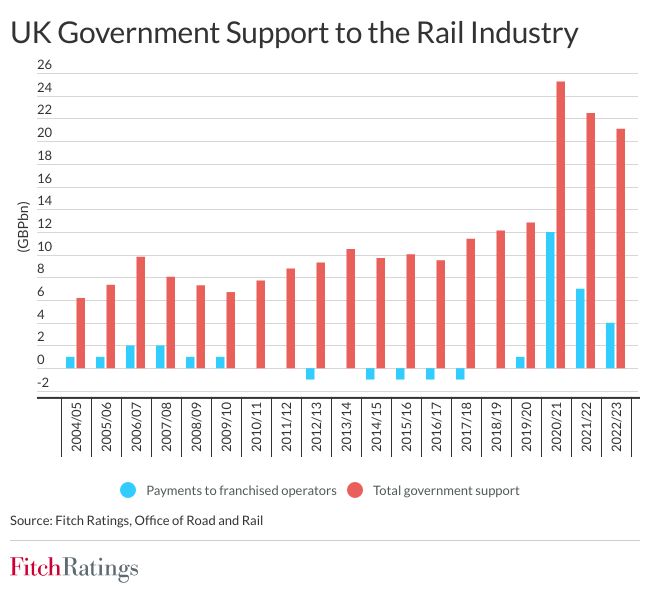
UK rolling stock leasing companies (ROSCOs) are not expected to see their credit profiles impacted by the government’s plans to transfer passenger rail services from private sector operators to public ownership, according to Fitch Ratings.
While the shift to a single public sector lessee could pressure leasing rates, this is anticipated to be offset by a reduction in lessee counterparty risk and more predictable revenue streams.

Access deeper industry intelligence
Experience unmatched clarity with a single platform that combines unique data, AI, and human expertise.

The Passenger Railway Services (Public Ownership) Bill, announced in July, lays the groundwork for the creation of Great British Railways (GBR) and is a key step towards the government’s objective of re-nationalising train operators within five years.
According to the Bill’s impact assessment, the government does not foresee any adverse effects on businesses within the rail supply chain, including ROSCOs, which remain essential to maintaining a strong private-sector supply chain for UK rail services.
Fitch Ratings suggests that the establishment of GBR and the government’s enhanced bargaining position as a sole lessee could put pressure on ROSCOs’ operating margins as new contracts are negotiated upon the expiration of existing agreements with private operators. However, this risk is mitigated by the prospect of more stable revenues due to reduced credit risk associated with a government counterparty and potentially longer-term contracts.
The Bill also opens the door to increased competition from open-access operators—private companies running services on Network Rail infrastructure without franchise agreements. While this could heighten competitive pressure on ROSCOs, it may also provide opportunities to re-lease idle fleets, reducing the risk associated with surplus rolling stock.

US Tariffs are shifting - will you react or anticipate?
Don’t let policy changes catch you off guard. Stay proactive with real-time data and expert analysis.
By GlobalDataChanges to the Railways Act 1993, included in the Bill, would make the appointment of a public sector operator the default option when national rail contracts with private operators expire or reach breakpoints. Additionally, the requirement to give 12 months’ notice before awarding contracts to public sector companies has been removed.
The Labour Party’s manifesto, along with previous legislative efforts related to the UK’s rail restructuring, have not proposed significant changes to the role of ROSCOs as private asset owners. Labour’s plans to remove barriers to sharing rolling stock across the network could, however, lead to higher utilisation rates, Fitch said.
Fitch Ratings notes that several factors critical to the long-term creditworthiness of ROSCOs remain uncertain. These include potential changes in contract lengths and the specifics of the tendering process, which could impact the stability of ROSCO business models.
ROSCOs, established during the privatisation of British Rail in the early 1990s, continue to own the majority of the UK’s rolling stock. While competition has increased, the market remains dominated by the three largest ROSCOs, including Eversholt Rail, which holds a BBB/Stable rating.
According to its website, Eversholt Rail Limited is a subsidiary of Eversholt UK Rails Group, owned by Eversholt UK Rails Group Limited, which is part of a consortium of Hong Kong-based companies including CK Infrastructure Holdings Limited, CK Hutchison Holdings Limited, Power Assets Holdings Limited, and CK Asset Holdings Limited.







